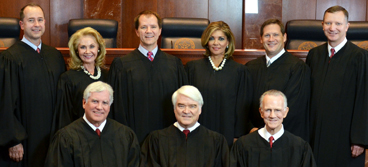AUSTIN – Al Hill Jr. v. Al Hill III is known in North Texas as the “spider web of litigation.” The decade-long heated battle between father and son has even spawned new legal battles between the clients and their lawyers over fees.
More than 20 tortured lawsuits have been filed involving the heirs of oilman H.L. Hunt, family trusts and various business entities. The lawsuits span more than 10 years with more than 100 lawyers hired and then fired in the billion-dollar family dispute. One of the attorneys described the litigation as the most intense case in their career.
So, it seemed a daunting task in the spring of 2010, when Hunt grandson, Albert G. Hill Jr. asked Dallas lawyer Gregory Shamoun, who represented Dallas Cowboys owner Jerry Jones in a sexual assault lawsuit by an exotic dancer, to make a fresh attempt to settle all of the cases against his son, Alfred G. Hill III.
Working on the case daily for several weeks, Shamoun – who once called a donkey named Buddy to testify in a court case – negotiated a global settlement that left Hill Jr. in exclusive control of a $1 billion family trust.
Shamoun, however, says he was never compensated for his work. He took Hill to court for breach of contract, citing an oral fee agreement with Hill that allegedly promised a 50-percent share of any settlement that fell between $55 million and $73 million. The settlement came in at $40.5 million.
The legal fee dispute reached the Texas Supreme Court this week with Shamoun’s $7.25 million jury award hanging in the balance.
Critics of the award, including the State of Texas, say it represents a “shocking” contingency-fee rate of $48,000 per hour for 150 hours of work and is illegal under a state law that requires contingency fee contracts be signed and in writing.
The trial court set aside the verdict, but the Fifth Court of Appeals in Dallas ruled in 2016 that the fee was legitimate under a common-law doctrine that allows recovery of payment for services rendered when the amount due is not stipulated in a legally enforceable contract.
If the underlying family drama pitting father against son isn’t enticing enough, the lawyers advocating for the two sides come with their own sidebar story.
To argue his side of the case, Hill Jr. hired Gibson, Dunn & Crutcher partner James Ho, who was nominated two weeks ago by President Trump to a seat on the U.S. Court of Appeals for the Fifth Circuit. The Shamoun & Norman law firm turned to Wallace Jefferson, a former chief justice of the Texas Supreme Court.

In one more twist, one of the justices hearing the arguments was Don Willett, who was nominated along with Ho for the federal appeals court. Willett asked no questions. Justice Eva Guzman was recused in the case.
Ho honed in on the contingency-fee nature of the award, saying the dollar amount isn’t as as much an issue as the illegal nature of an oral fee agreement that is contingent on the outcome of a case. Such an arrangement is illegal, Ho said, under the Texas “statute of frauds,” a provision in the Government Code pertaining to attorney conduct.
“What the Legislature has chosen in this very historically sensitive area of contingency fee is that you have to get that signed into writing, specifically to make sure that the client has in fact” agreed to terms, Ho said.
Texas Solicitor General Scott Keller spoke as an amicus attorney in support of Hill. Asked by Justice Paul Green whether Shamoun might be entitled to some payment, Keller said he could charge his regular rate of $600 an hour for a total recovery of $90,000.
Jefferson invited the justices to put themselves in the jury’s shoes, hearing evidence about phone calls involving Shamoun, Hill, and Hill’s longtime personal lawyer Frances Wright. The conversations include discussions of an agreement that Shamoun would be paid 50 cents on the dollar for any settlement below $73 million. The global settlement, sealed in federal court, was about $40.5 million, Jefferson said.
Hill was insistent that all of the cases be settled before an upcoming trial involving racketeering claims and perjury allegations, Jefferson said, and told Shamoun he wanted him “vested” in the outcome. When pushed to put the fee agreement in writing, Hill denied agreeing to the terms and fired Shamoun, Jefferson said.
“You read this testimony and it becomes clear,” Jefferson said. “The jury was asked what is reasonable under these circumstances.”
Jefferson said the jury’s award was based on the reasonable value of Shamoun’s services and was less than the amount he would have been due under the oral agreement.
The Supreme Court of Texas has improved the quality of its oral argument video. Watch the arguments in Hill v. Shamoun & Norman here.
